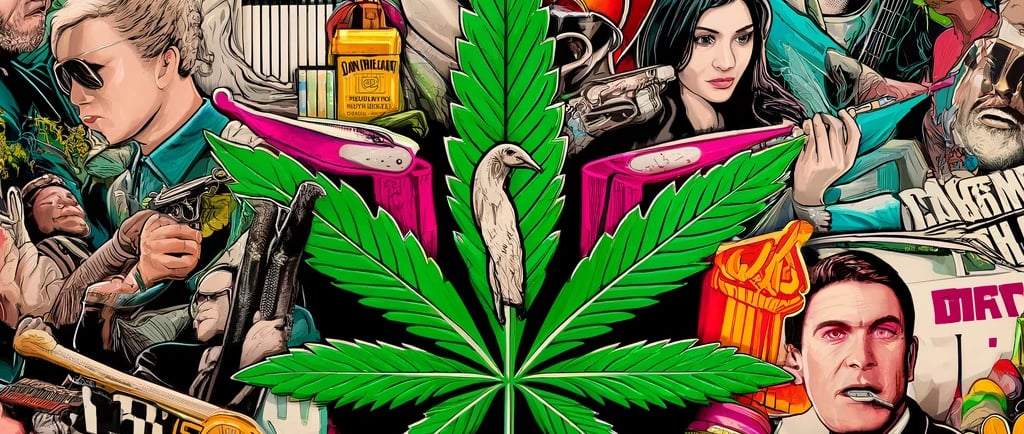Cannabis in Pop Culture: From Rebellion to Mainstream Acceptance
Cannabis has played a significant role in shaping pop culture, evolving from a symbol of countercultural rebellion to a mainstream phenomenon embraced by a wide audience. This article explores the journey of cannabis through various facets of pop culture, including music, movies, television, and literature, highlighting its influence on societal perceptions and its eventual normalization.
CANNABIS GUIDE
4/21/20242 min read


Cannabis in Music
The relationship between cannabis and music is long-standing, with genres such as jazz, rock, reggae, and hip-hop frequently referencing cannabis both as an inspiration and a symbol of resistance. Iconic musicians like Bob Marley, Snoop Dogg, and Willie Nelson have not only promoted cannabis through their lyrics but have also become synonymous with cannabis advocacy, influencing generations of fans.
Cannabis in Film and Television
Cannabis has had a prominent presence in films and television, often used to define characters or set the tone of narratives. In the early days, it was portrayed with a negative connotation, as seen in propaganda films like "Reefer Madness." Over time, cannabis began to feature in comedies and dramas more sympathetically, reflecting a shift in public opinion. Films like "Pineapple Express" and television shows such as "Weeds" and "That '70s Show" have played significant roles in normalizing cannabis.
Cannabis in Literature
Cannabis has also been a subject in literature, where it has been depicted in myriad forms—from a muse for beat poets like Allen Ginsberg to a complex theme in contemporary novels that explore its social and philosophical implications. The representation of cannabis in literature has mirrored its evolving legal and cultural status.
The Role of Media in Normalization
The media has been pivotal in shifting cannabis from a taboo subject to a more accepted element in popular culture. As more celebrities and public figures openly discuss and endorse cannabis, its image as a harmful substance has diminished, making it a part of everyday life for many people.
Challenges and Controversies
Despite its widespread acceptance in pop culture, cannabis still faces challenges and controversies. Its portrayal can sometimes perpetuate stereotypes or trivialize the serious implications of its use, especially among younger audiences. Moreover, the portrayal often lacks diversity, failing to adequately represent the racial and social injustices linked to cannabis prohibition.
Future Trends
Looking ahead, cannabis is likely to continue influencing pop culture, with potential new narratives as legalization expands. This could lead to more diverse and nuanced portrayals that consider the complexities of cannabis, including its medical uses and the impact of legalization on various communities.
Conclusion
Cannabis has indelibly shaped pop culture, transforming its image and acceptance through various media over decades. As cannabis continues to be a topic of interest and debate, its portrayal in pop culture will undoubtedly evolve, reflecting broader societal changes and contributing to its ongoing normalization.
